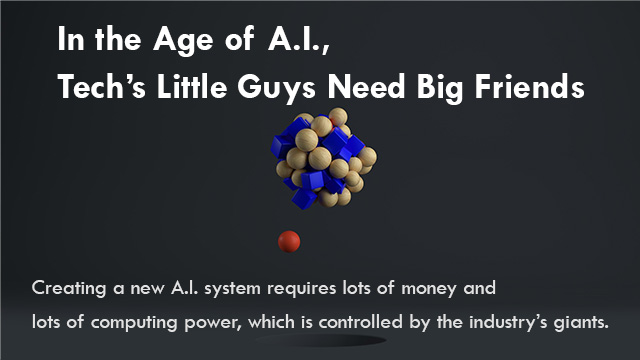In the Era of Artificial Intelligence, Small Tech Players Seek Powerful Allies

Developing a new Artificial Intelligence (A.I.) system requires a significant amount of money and access to powerful computers, which are mostly owned by the big companies in the industry.
In the era of artificial intelligence (A.I.), the creation and advancement of new A.I. systems are heavily reliant on substantial financial resources and access to high computing power. These requirements pose significant challenges for smaller tech companies and startups that may lack the necessary funds and infrastructure to compete with industry giants.
Developing A.I. technologies involves various costly components. First and foremost, acquiring and processing vast amounts of data is crucial for training A.I. models effectively. This data can be expensive to collect, clean, and label. Additionally, hiring skilled researchers, engineers, and data scientists proficient in A.I. adds to the financial burden. These experts demand competitive salaries, further straining the resources of smaller companies.
Moreover, the development process itself requires significant computing power. A.I. models often require complex computations and large-scale training processes that necessitate access to powerful hardware and infrastructure. The industry's giants have built extensive data centers and cloud computing platforms, giving them a distinct advantage in terms of computational resources.
This concentration of resources in the hands of a few dominant companies raises concerns about competition, innovation, and equal access to opportunities. Smaller tech companies may struggle to enter the A.I. market or keep up with the pace of advancements due to limited financial capabilities and access to computing power.
To address these challenges, industry experts propose the formation of alliances and collaborations between smaller and larger players. By partnering with industry giants, smaller firms can gain access to funding, data, and computing resources that would otherwise be challenging to obtain independently. This enables them to compete on a more level playing field and drive innovation in the A.I. space.
In addition to collaborations, policymakers and regulators are exploring measures to promote competition and fairness. Antitrust investigations and regulations are being considered to prevent monopolistic practices by big tech companies, ensuring that smaller players have a fair chance to thrive. Efforts are also being made to encourage knowledge sharing, open-source initiatives, and public-private partnerships to democratize access to A.I. resources and expertise.
Furthermore, initiatives are underway to foster A.I. education and skill development. By equipping individuals and smaller organizations with the knowledge and tools to engage with A.I., there is a potential to expand the pool of innovators and foster a more diverse and inclusive A.I. community.
Overall, while the dominance of big tech companies in A.I. presents challenges for smaller players, collaborations, regulatory actions, and educational initiatives are being pursued to address these concerns. By leveling the playing field and promoting fair competition, the industry can unlock the potential for groundbreaking A.I. innovations and ensure that the benefits of A.I. are accessible to a broader spectrum of participants.
Start-up success stories in the tech industry have always been inspiring, from Hewlett-Packard to Google. However, the rise of artificial intelligence (A.I.) is changing the game, making it increasingly difficult for small start-ups to compete. The reason is that creating A.I. systems requires substantial amounts of money and computing power, both of which are largely controlled by big tech companies.
For example, Aiden Gomez and Nick Frosst, former Google employees, wanted to create their own A.I. start-up called Cohere. However, they quickly realized that they needed enormous computing power to build their technology. They turned to Google and, after approval from Google's CEO, were granted access to the computing resources they needed.
The truth is, building a groundbreaking A.I. start-up without the support of major players, known as "hyperscalers," is extremely challenging. These hyperscalers have vast data centers that are essential for running A.I. systems effectively. This puts big tech companies in a dominant position, shaping the future of the tech industry.
Even OpenAI, the company behind ChatGPT, raised $10 billion from Microsoft, and most of that money goes back to Microsoft to pay for using their massive computer clusters. These clusters consist of thousands of specialized chips and are crucial for improving and expanding A.I. technologies like ChatGPT.
To stay competitive, other start-ups have made similar arrangements. Cohere, Anthropic, Character.AI, and Inflection AI are just a few examples. These companies secure funding to purchase computing power from giants like Google.
The situation is complex, but one thing is clear: access to significant computing power is crucial for competing in the A.I. space. Without it, start-ups struggle to keep up with advancements made by big tech companies. However, there is a glimmer of hope through open-source software. Meta, another major player in the field, has open-sourced its latest large language model, allowing anyone to use it and build upon it. This kind of freely available software has the potential to level the playing field and foster competition.